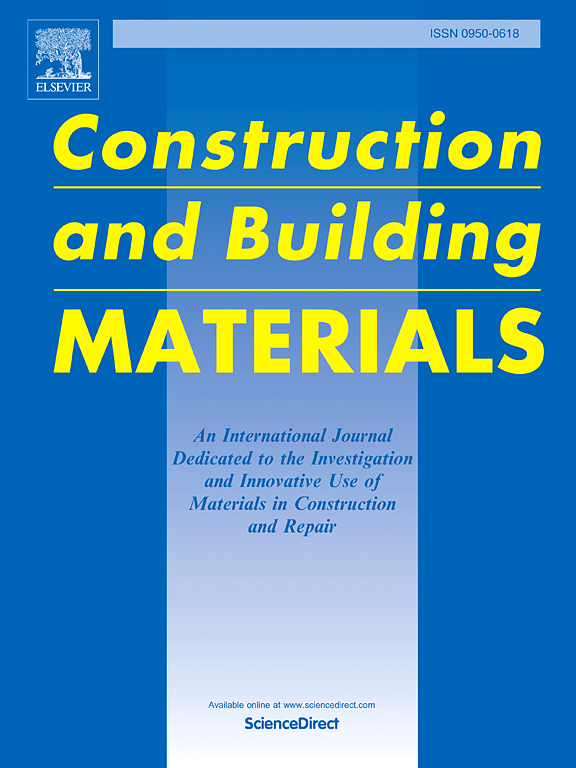Development and characterization of saturated fatty acids and biopolymer based novel multilayer encapsulated phase change materials system for buildings
IF 7.4
1区 工程技术
Q1 CONSTRUCTION & BUILDING TECHNOLOGY
引用次数: 0
Abstract
Application of encapsulated phase change materials (PCM) is becoming an attractive passive measure to develop energy efficient buildings. In the present work, the eutectic mixture of two saturated fatty acids (lauric acid and palmitic acid in 80:20 ratio, HTPCM) was selected and encapsulated in a novel multilayer architecture to develop PCM beads. The bead architecture includes a PCM core enveloped by thermally conductive calcium alginate (Ca-Alg) biopolymer + multiwall carbon nanotubes intermediate shell to promote heat transfer from the core and the outer rugged coating of flyash + water-based polyurethane (PU) to improve mechanical integrity and interlocking with wet cement mortar matrix during mix preparation. The thermal characteristics of four pure PCM (capric acid, lauric acid, myristic acid, and stearic acid) and one eutectic mixture (HTPCM) were measured using differential scanning calorimetry (DSC) to select the suitable PCM as per prevailing local ambient temperature. As per scanning electron microscopy (SEM) results, the average core size is in the range of 1.5 – 2.0 mm and PCM is stored in the bead core as tiny globules separated by Ca-Alg membrane. Single bead compression test performed on multilayer PCM (m-PCM) bead show that the shell of the bead possesses sufficient mechanical strength. The Fourier transformed infrared spectroscopy (FTIR) analysis and thermogravimetric analysis (TGA) studies confirm that the HTPCM and coating materials are chemically / thermally stable through different steps of fabrication and heating / cooling thermal cycles. Finally, the filter paper leakage test showed that the multilayer bead shell can prevent the PCM leakage from the core during bead heating. The various test results reported herein corroborate that the proposed architecture provides good physical properties and mechanical strength to the encapsulated PCM beads.
基于饱和脂肪酸和生物聚合物的新型建筑用多层封装相变材料系统的开发与表征
封装相变材料(PCM)的应用正成为开发节能建筑的一种有吸引力的被动措施。在本研究中,我们选择了两种饱和脂肪酸(月桂酸和棕榈酸,比例为 80:20,HTPCM)的共晶混合物,并将其封装在一种新型多层结构中,以开发 PCM 珠。该珠子结构包括由导热海藻酸钙(Ca-Alg)生物聚合物+多壁碳纳米管中间层外壳包裹的 PCM 内核,以促进内核的热量传递,以及粉煤灰+水性聚氨酯(PU)的凹凸不平的外层,以提高机械完整性和在混合料制备过程中与湿水泥砂浆基质的互锁性。使用差示扫描量热仪(DSC)测量了四种纯 PCM(癸酸、月桂酸、肉豆蔻酸和硬脂酸)和一种共晶混合物(HTPCM)的热特性,以根据当地环境温度选择合适的 PCM。扫描电子显微镜(SEM)结果表明,珠心的平均尺寸在 1.5 - 2.0 毫米之间,PCM 以被 CaAlg 膜分离的小球形式储存在珠心中。对多层 PCM(m-PCM)珠子进行的单珠压缩测试表明,珠子的外壳具有足够的机械强度。傅立叶变换红外光谱(FTIR)分析和热重分析(TGA)研究证实,HTPCM 和涂层材料在不同的制造步骤和加热/冷却热循环中具有化学/热稳定性。最后,滤纸泄漏测试表明,多层微珠外壳可以防止微珠加热过程中 PCM 从芯部泄漏。本文所报告的各种测试结果证实,所提出的结构为封装的 PCM 微珠提供了良好的物理性能和机械强度。
本文章由计算机程序翻译,如有差异,请以英文原文为准。
求助全文
约1分钟内获得全文
求助全文
来源期刊

Construction and Building Materials
工程技术-材料科学:综合
CiteScore
13.80
自引率
21.60%
发文量
3632
审稿时长
82 days
期刊介绍:
Construction and Building Materials offers an international platform for sharing innovative and original research and development in the realm of construction and building materials, along with their practical applications in new projects and repair practices. The journal publishes a diverse array of pioneering research and application papers, detailing laboratory investigations and, to a limited extent, numerical analyses or reports on full-scale projects. Multi-part papers are discouraged.
Additionally, Construction and Building Materials features comprehensive case studies and insightful review articles that contribute to new insights in the field. Our focus is on papers related to construction materials, excluding those on structural engineering, geotechnics, and unbound highway layers. Covered materials and technologies encompass cement, concrete reinforcement, bricks and mortars, additives, corrosion technology, ceramics, timber, steel, polymers, glass fibers, recycled materials, bamboo, rammed earth, non-conventional building materials, bituminous materials, and applications in railway materials.
 求助内容:
求助内容: 应助结果提醒方式:
应助结果提醒方式:


